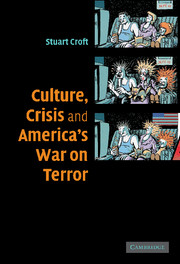Alexander, Bevin, How America Got It Right, New York: Dutton, 2005
Anderson, Jeffrey, Sleeper Cell, New York: Berkley, 2005
Bacevich, Andrew J., American Empire, Cambridge, MA: Harvard University Press, 2002 The New American Militarism, New York: Oxford University Press, 2005
Bergen, Peter, Holy War Inc., New York: Free Press, 2002
Brown, Dale, Act of War, New York: Atari, 2005
Brown, Michael E. (ed.), Grave New World, Washington, DC: Georgetown University Press, 2003
Burke, Robert, Counter Terrorism for Emergency Responders, Boca Raton, FL: Lewis Publishers, 2000
Buzzell, Colby, My War: Killing Time in Iraq, New York: Putnam Books, 2005
Calhoun, Craig, Price, Paul and Timmer, Ashley (eds.), Understanding September 11, New York: New Press, 2002
Chesnoff, Michael, The Arrogance of the French: Why They Can't Stand Us – and Why the Feeling is Mutual, New York: Sentinel, 2005
Clancy, Tom, The Teeth of the Tiger, New York: G. P. Putnam, 2003
Clarke, Richard, Against All Enemies: Inside America's War on Terror, New York: Free Press, 2004
Coulter, Ann, How to Talk to a Liberal (If You Must), New York: Crown Forum, 2004
Crawford, John, The Last True Story I'll Ever Tell, New York: Riverhead Books, 2005
Crouch, Paul, The Shadow of the Apocalypse, New York: Berkley, 2004
Cunningham, Michael, Specimen Days, New York: Farrar, Straus & Giroux, 2005
DeFelice, Jim, Threat Level Black, New York: Pocket Books, 2005
DeMille, Nelson, Night Fall, New York, Warner, 2004
Dickson, Paul, Sputnik: The Shock of the Century, New York: Walker & Co., 2001 Dixon, Wheeler Winston (ed.), Film and Television after 9/11, Carbondale, IL: Southern Illinois University Press, 2004
Dwyer, Jim and Flynn, Kevin, 102 Minutes: The Untold Story of the Fight to Survive Inside the Twin Towers, New York: Times Books, 2005
Eagleton, Terry, After Theory, London: Penguin, 2003
Edkins, Jenny, Trauma and the Memory of Politics, Cambridge: Cambridge University Press, 2003
Evans, Michael D., Beyond Iraq: The Next Move – Ancient Prophecy and Modern Day Conspiracy Collide, Tulsa, OK: Harrison House, 2003
Evans, Michael D. The American Prophecies: Ancient Scriptures Reveal Our Nation's Future, New York: Warner Faith, 2004
Flynn, Stephen, America the Vulnerable: How Our Government is Failing to Protect us from Terrorism, New York: HarperCollins, 2004
Franken, Al, Lies and the Lying Liars Who Tell Them, New York: Dutton Adult, 2003
Freiling, Thomas M. (ed.), George W. Bush On God and Country, Fairfax, VA: Allegiance Press, 2004
Frum, David, The Right Man, London: Weidenfeld & Nicolson, 2003
Gaddis, John Lewis, Surprise, Security and the American Experience, Cambridge, MA: Harvard University Press, 2004
Griffin, W. E. B., By Order of the President, New York: Putnam, 2004
Hannity, Sean, Deliver us from Evil: Defeating Terrorism, Despotism and Liberalism, New York: Regan Books, 2005
Hartley, Jason Christopher, Just Another Soldier, New York: HarperCollins, 2005
Hay, Colin, The Political Economy of New Labour, Manchester: Manchester University Press, 1999
Huntington, Samuel Who Are We? America's Great Debate, London: Simon & Schuster, 2004
Jackson, Richard, Writing the War on Terrorism, Manchester: Manchester University Press, 2005
Jeffrey, Grant, War on Terror: Unfolding Bible Prophecy, New York: Water Brook Press, 2002
Kagan, Robert, Paradise and Power: America and Europe in the New World Order, New York: Random House, 2003
Kent, Gordon, Force Protection, New York: Delacorte, 2004
Krugman, Paul, The Great Unraveling, New York: W. W. Norton, 2004
Ledeen, Michael, The War Against the Terror Masters, New York: St Martin's Press, 2002
Ludlum, Robert and Lynds, Gayle, Robert Ludlam's The Paris Option, New York: St Martin's Griffin, July 2002
MacDonald, William, Armageddon Soon?, Kansas City: Walterick Publishers, 1991
Malkin, Michelle, Invasion: How America Still Welcomes Terrorists, Criminals and Other Foreign Menaces to Our Shores, Washington, DC: Regnery, 2002
Malkin, Michelle In Defense of Internment: The Case for ‘Racial Profiling’ in World War Two and the War on Terror, Washington, DC: Regnery, 2004
Marsh, David, Buller, Jim, Hay, Colin, Johnston, Jim, Kerr, Peter, McAnulla, Stuart and Watson, Mathew, Postwar British Politics in Perspective, Cambridge: Polity Press, 1999
McCourt, Frank, Giuliani, Rudy and Von Essen, Thomas, Brotherhood, New York: American Express Publications, 2004
Miniter, Richard, Losing Bin Laden: How Bill Clinton's Failures Unleashed Global Terror, Washington, DC: Regnery, 2003
Miniter, Richard Shadow War: The Untold Story of How Bush is Winning the War on Terror, Washington, DC: Regnery, 2004
Munslow, Alun, The New History, Harlow: Pearson, 2003
Rampton, Sheldon and Stauber, John, Weapons of Mass Deception, New York: Jeremy P. Tarcher, 2003
Reich, Christopher, The Devil's Banker, New York: Dell, 2003
Robinson, Patrick, Barracuda 945, New York: Harper Torch, 2004
Rosenberg, Joel C., The Last Jihad: A Novel, New York: Forge, 2002
Savage, Michael, Liberalism is a Mental Disorder, Nashville, TN: Nelson Current, 2005
Schmidt, Vivien, The Futures of European Capitalism, Oxford: Oxford University Press, 2002
Schweikart, Larry and Allen, Michael Patrick, A Patriot's History of the United States, New York: Sentinel, 2004
Silberstein, Sandra, War of Words, London: Routledge, 2002
Spiegelman, Art, In the Shadow of No Towers, New York: Pantheon, 2004
Stelzer, Irwin M., The NeoCon Reader, London: Atlantic Books, 2004
Todd, Emmanuel, After the Empire, New York: Columbia University Press, 2003
Weigl, George, The Cube and the Cathedral, New York: Basic Books, 2005
Weisman, John, SOAR, New York: Avon, 2003
Whitcomb, Christopher, White, New York: Little, Brown & Co., 2005
Woodward, Bob, Plan of Attack, New York: Simon & Schuster, 2004
Zeman, David, The Pinocchio Syndrome, New York: Doubleday, 2003





